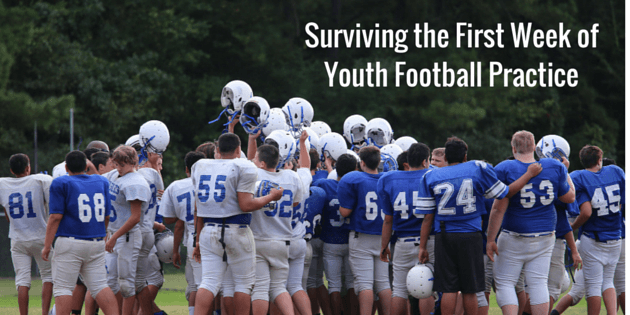
Surviving the First Week of Youth Football Practice
The first week of youth football practice is almost here!
This is one of most exciting weeks of the year.
It’s also one the scariest and most difficult weeks of the year for players at all levels.
I know I felt that excited, nervous feeling every single year I started a football season.
As I got older there were a few questions that I would always ask myself.
Am I in good enough shape?
Where do I fit in on this team?
Will I be good enough to play?
How hard is this first couple of weeks going to be?
Will I make it?
That anxiety mixed with excitement is something that makes football very special.
I never felt like that with any other organized sport that I played.
As a first year player, at ever level, there is also a sense of fear.
Fear of the unknown.
It’s a fear that can be overcome.only going through a tough couple weeks of practice with your teammates can be overcome
Overcome, only by going through a tough couple weeks of practice with your teammates.
Those experiences will force your athlete to form a bond with his teammates that will last a lifetime.
Again, that is what is so special about football.
So what can you do as a parent to help your athlete get through that first week of youth football practice?
Make football the best experience possible for your child.
Here are some tips to help your athlete survive that first week.
[video_player type=”embed” width=”640″ height=”360″ align=”center” margin_top=”0″ margin_bottom=”20″]![]() [/video_player]
[/video_player]
5 Tips to Survive the First Week of Youth Football Practice
1. Stay hydrated and eat well.
Water, water, water!
Late July and early August is hot all over the U.S.
Your athlete needs to drink lots of water to stay hydrated.
Eating healthy is also important.
Don’t let your kid sit around and eat junk food all day.
There’s nothing worse than having a belly ache in 90-degree weather while you’re working out.
2. Get rest.
Football is a physically challenging sport.
Regardless of how fit your athlete is at the beginning of the football season, their bodies will be sore and tired.
They need good rest.
Be sure that your athlete is getting a solid 8 hours of sleep minimum every night.
It may still be summer, but staying up late to play video games and watch tv will not help your athlete recover.
The best remedy for sore, tired muscles is rest.
Also, try to get your athlete in a pool if you have access.
This is also great for recovery.
Just don’t let them go nuts for hours and defeat the purpose of pool time for recovery.
3. Wear comfortable clothes.
The one thing I did every year I played in college was to break my cleats in.
Just get a few workouts in with your cleats on.
Have your athlete get together with some friends and play touch football or even wiffleball while wearing their cleats.
Make sure your athlete is comfortable with their clothes too.
Showing up to practice in jean shorts is not comfortable.
Get some athletic clothes.
If you’re not sure what your athlete needs then ask the coaches.
You don’t have to break the bank with Nike and Under Armour gear but you need to get them comfortable clothes.
4. Let the coaches coach.
Trust that the coaches for your child’s team know what they are doing.
And remember… almost all of them are volunteers.
Don’t be barking at people who are willing to work with your kids for nothing.
Especially when you are not.
Every youth program welcomes help.
If you feel like you can contribute to the program let those in charge know and see if there is a need you can fill.
As a dad myself, I know first hand it can be difficult to coach your own child.
Keep this in mind as you volunteer to coach.
Whatever you do, don’t be an armchair quarterback for 6th-grade youth football practice.
Nobody likes that parent.
Nobody.
5. Don’t let them quit.
I live by the saying, “If it were easy, everyone would be doing it.”
Football is hard.
It’s not for everybody but your child won’t know that if they quit after the first day.
The first day your child practices in pads will probably be the most difficult day of football in their entire lives.
This is when parents most often get the, “I want to quit. Football is too hard.”
Don’t let your child quit because it’s too hard.
Hard is what makes it worthwhile.
Hard is what makes it fun.
Hard is what teaches life lessons that your child will carry with them for the rest of their lives.
I recently wrote a post about how I Almost Quit Football.
It is my belief (which I learned from my dad), that when you start something you finish it.
You never quit because it’s too hard.
99% of kids who say they want to quit after that first day, if they stick it out for a week, will love football forever.
You as a parent have to be strong enough to help them realize that.
If after that first week they hate it, go talk to the coach.
Make sure nothing else is going on.
If there isn’t any other reason and your child just doesn’t like it, then make a decision.
Just make sure this is not a lesson that your child misses because YOU are not strong enough to help teach it.
This really is one the greatest couple of weeks of the year.
Some of the things I remember…
…the smell of the cut grass, the nervous feeling leading up to practice each day, the laughs I had with my friends, the difficulty of conditioning and how much I hated it, and the elation of finishing a practice each day.
What do you remember from youth football practice?
Leave a comment and let us know.
Football has taught me so much and so much of that came through overcoming difficult times.
Enjoy this time in your child’s life and help them to create awesome memories.
I hope you found some value with today’s post.
If you did please like, comment and share.
Play Big!
Coach Steve
PS: Stay up-to-date with TrenchTraining.com and joining our mailing list by clicking here.
Photo credits:






